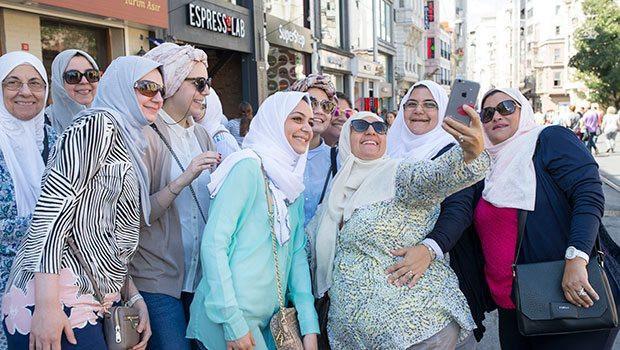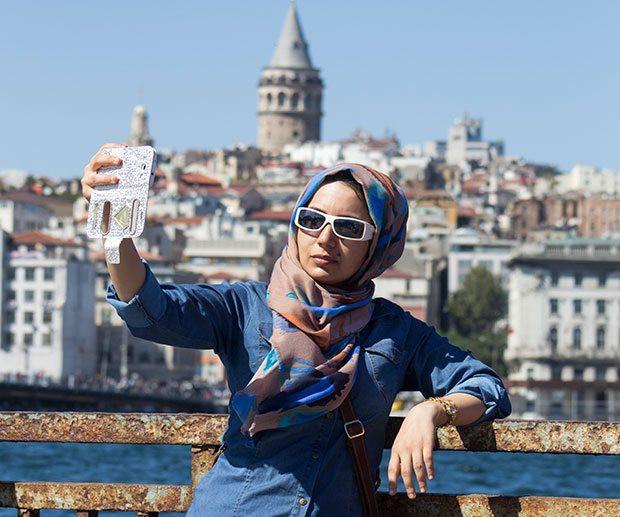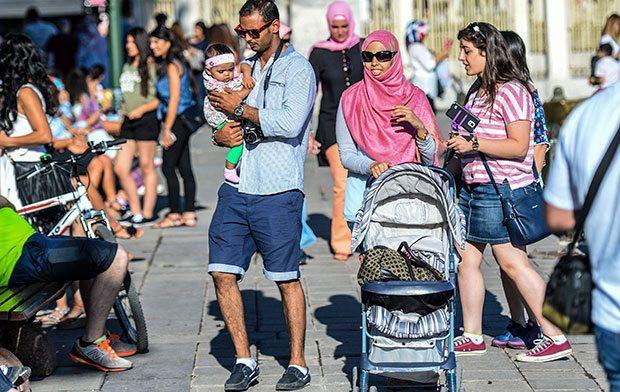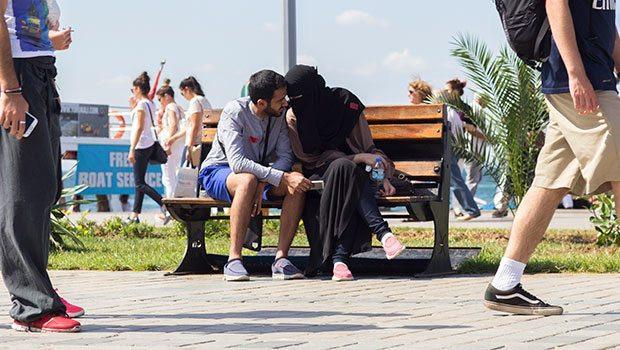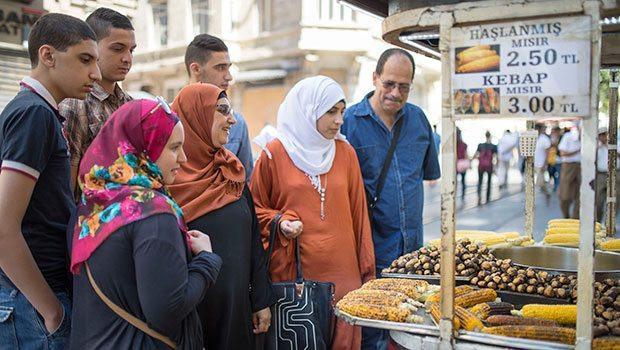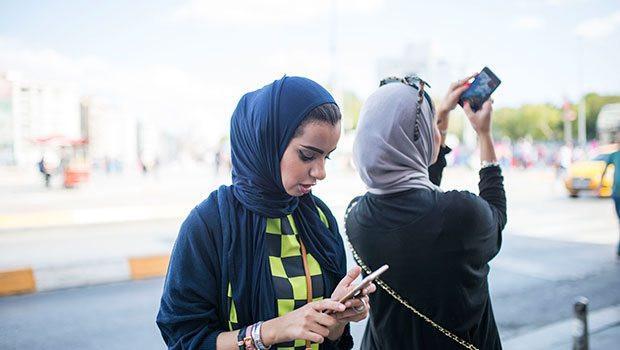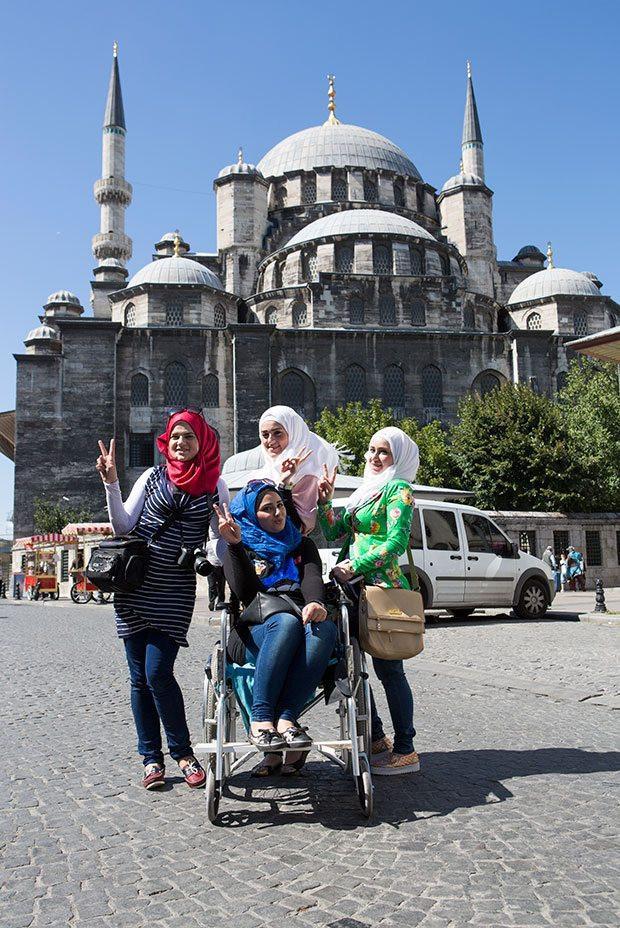Al-Istanbul: How Turkey’s largest city became a hub for Arab tourists
Report: İpek Yezdani / İpek İzci Photos: Selçuk Şamiloğlu / Murat Şaka / Emre Yunusoğlu / Didar Karataş
 1) Why do Arabs visit Turkey?
1) Why do Arabs visit Turkey?•
They say they feel more comfortable and safe in Istanbul.
•
They find Turkey both European and close to home. They find it safe. They enjoy hearing the call to prayer and having the means to religious service whenever it is necessary.
•
Pretty much all of them have been influenced by Turkish TV shows.
•
They like five-star hotels on the Bosporus as well as the ones in Talimhane and Sultanahmet.
•
Among the reasons is the fact that they can consume halal products.
•
They like iskender and simit the most. They are crazy about kumpir. Their dessert of choice is usually baklava but only if it is with ice-cream.
•
Alongside Istanbul, they also prefer Bursa, Bolu, Abant, Yalova and Trabzon. They almost never cross to the Asian side of Istanbul.
2) An Arab’s favorite venues in Istanbul
According to Arabic tour guide Münevver Şamlı:
• Taksim (İstiklal Avenue)
• Topkapı Palace (especially the Islamic relics, jewellery and parts of the harem)
• A Bosphorus tour
• İstinyePark and Cevahir (shopping malls to find everything at the same place)
• Büyükada (to ride the coaches on the Princes’ Islands)
• Sultanahmet Mosque and the Grand Bazaar
• Vialand (for the kids)
• The “Muhteşem Yüzyıl” (Magnificent Century) TV show exhibit in Maslak
• Yeni Camii and the Spice Market in Eminönü
• The Whirling Dervish shows in Hocapaşa
3) People from various Arab countries differ in their preferences
Arabic tour guide Hüseyin Hizmetçi gave of his observations:
•
Arab tourists are not a single homogenous group. They are divided into three categories: those coming from Gulf countries, eastern Mediterranean countries such as Lebanon, Jordan and Palestine and the ones from North Africa.
•
A significant part of the tourists from the Gulf area state they feel more comfortable here than they do in their own countries.
•
The ones from the eastern Mediterranean are more interested in Roman and Byzantine history, demanding to go to historical sites such as the Hagia Sophia. These people are also epicures; the first thing they ask is recommendations for good restaurants on the Bosporus.
•
The tourists from the Gulf countries such as Saudi Arabia, Qatar and Kuwait are more introverted; they do not want their wives or daughters speaking to male strangers. They are not very interested in Roman and Byzantine history; they prefer going to shopping malls. They like fast food.
•
The ones coming in from Maghreb countries such as Tunisia, Morocco and Algeria show traces of French culture alongside Arabic culture (due to their years as French colonies) and their demands are fitting to this. They wish to see Turkish nights, belly dancers, etc.
•
They are more uneasy about shopping compared to before because of the behavior of the shopkeepers. Unfortunately there was a case of Arab tourists being despised by Turkish shopkeepers. With the “Arab’s must have a lot of money” mindset, they charge two to three times the amount for an item. Also, Turkish shopkeepers tend to be overly attentive and see themselves as superior while the opposite is valid in the case of Arabs.
4) The economic aspects of Arab tourism
Başaran Ulusoy, the president of the Association of Turkish Travel Agencies (TÜRSAB), said:
• Arab tourists usually come with their families and consist of large groups.
• Sometimes a family of thirty comes; they are so rich that they leave after a week having spent 70,000 to 80,000 euros.
• The incoming Arab tourists wish to be picked up at the airport by private luxury vehicles, however because the municipality does not provide such a place in the airport, they are unable to pick up tourists with their own vehicles.
• The attitude of society and shopkeepers towards Arabs needs to change. They need to provide service to all incoming tourists regardless of their skin color, race or nationality without toying with their pride.
5) Testimonies from Arab tourists
• Monaya el Kassih (22): “Turkish TV shows are like advertisements for Istanbul. When we are watching them we do not only watch the actor but also the setting in awe. Then we come here.”
• Ahmed Mahruki (45, Oman): “This is my fourth time in Turkey. I like Istanbul and Bursa the most. The one thing I do not like here is that there are a lot of beggars.”
• Saleh Alenzi (35, Kuwait): “I love Istanbul. My favorite thing is the coolness of the weather. It may feel hot to you at the moment but it is cool for us because in Kuwait it is 60 degrees.”
• Mustafa Mufak (58, Syrian but living in UAE): “Turkey is a lot like Syria in many aspects, reminding us of our country. We felt terribly sad when we saw the Syrian refugees here, tried to help some but in the end how many can we help?”
• Muhammet Arafat (35, UAE): “I have been coming back and forth to Turkey. The people have gotten used to living with foreigners but I believe their attitudes are hardening.”
• Amyrah (Bahrain): “The people are not very nice. They are rude. I travel a lot and I had several bad things happening to me. I do not like people giving me mean stares and I think there are only a small amount of people here who smile.”
• Muhammed Sami el Ecmir (Kuwait): “I like Bursa very much; it is greener, quieter and calmer. Moreover the Bursa locals are very nice and friendly. We bought a housing estate there with 33 families. But my wife and daughters like Istanbul more for shopping.”
• Abdur Rahman (35, Saudi Arabia): “The people here are nice but they could be kinder. The food is delicious but the people are angry and unhappy. We have been ill-treated by both the vendors as well as the people on the street. Do you think this is because we are Arabs?”
• Mona Mumni and Sehrarat Kolaylat (Lebanon): “This place is a lot like Lebanon. Everyone dresses as they please, people are usually helpful. However some vendors have not been very kind to us. There have been occasions in which they did not respond to us because we spoke Arabic.”
• An Arab tourist who did not want to be named: “Some waiters, upon looking at me, immediately understand what I want. My orange juice is brought to the table with vodka in it. I do not have to say anything.”
6) Testimonies from Turks
• Kemal Karadağ, manager of the Kapri Restaurant in Büyükada: “While European tourists prefer the winter, there are lots of Arab tourists coming in in the summer. However the Arabs make a huge mess; a profound cleaning starts upon their departure.”
• Ali Baba Restaurant manager Ali Huzmeli: “They make a big contribution to Turkey. If it weren’t for the Arabs, we would close up shop. However they give us a big headache; their children disturb the surroundings.”
• A waiter at Ali Baba Restaurant: “The Arabs never tip. They must think, ‘I am an Arab, I have money and I can get whatever I want.’”
• A manager in Ortaköy, who wanted to remain anonymous, explained Arab customers as such: “What Arabs like most in an establishment is being attended to. I assign a waiter to their table and he does whatever they ask from him, putting up with all of their whims. He endures them so much so that when the check comes at the end of the night, it is at the point where they cannot object to it. The number of people at the table taken into account, if the sum they are going to pay is estimated at 500 Turkish Liras, then that is how it works. Besides, I can raise that 500 to 1,000. They leave a generous tip because of all the attention they receive. The most generous are the Jordanians. A few days back someone left a 100 lira tip for a 300 lira check. They eat iskender the most and surely demand a salad, kebab and pizza at the table. They set the table first and feast their eyes. They mostly drink tea with shisha.”
• Görkem Vardar from the Memory International hospital: “90 percent of our clientele are of Arab descent. They show a heavy interest in the developing residence projects in Istanbul. They demand houses mainly from Beylikdüzü, Esenyurt, Bahçeşehir and Beykent. There can be new projects there that are moderately-priced, social facilities and security included, close to shopping malls. They mostly show interest in 2+1 houses but the majority is large families. We have had clients looking to buy two 3+1 apartments, turning them into a six-bedroom apartment. The largest sale we made at once was a villa on the Bosphorus worth $ 2.5 million.”
6) Reporters’ observations
• A common statement from the Arabs was the contentedness they felt from the spreading of Arabic onto billboards and menus as it makes their lives easier. Almost all of them desired having a house in the city, however also felt it was an unnecessary expense, as they were only able to come once a year. They say that not being able to find a furnished house was a distress.
• There were those who got up to go to the bathroom and drank wine at the bar before siting if there was another man at the table other than themselves. There were also ones who drank wine out of coffee cups. After a while the one sitting across from them asked for the same thing. Of course it was evident from the smell but not put into words. It was more than a few times that I poured beer in a Red Bull bottle and served it.
• We chatted with a male Saudi group whilst waiting for their wives in the bathroom. They did not state their names or professions. They said they continued their evening stroll after dropping off their wives to their rental house. They made a habit of going into a different club in Taksim every time. However when it came to consuming alcohol, they said they have not tried rakı because of its smell and that their favorite was whiskey. Just then their wives came out and they hastily moved away.
• Ironically, some Arab tourists recently became concerned about the increased number of Arab tourists in Turkey. A Kuwaiti couple, Nasır el Rababa and Haya el Rababa, bought a house in the western Turkish province of Bolu in which they reside from May until September every year. Unlike other Arab tourists we spoke to, they said they “do not like Istanbul anymore” and that “Bolu is our home now.” When asked “Why?” Haya el Rababa gave us a surprising answer: “Five years ago when we first came to Istanbul, it was not as crowded, we loved it. Now it has become overpopulated, there are a lot of Arab tourists. Syrian and Iraqi street vendors are constantly trying to sell us something.” Her husband agreed: “Five years ago when we came to Taksim, we ate Turkish food in the restaurants in Istanbul. Nowadays everything is intermingled; they sell Syrian, Iraqi, Lebanese food everywhere. We want only Turkish food in Turkey.” The couple wants the Turkish government to build an airport in Bolu so that they can go there without stopping in annoying Istanbul!

 1) Why do Arabs visit Turkey?
1) Why do Arabs visit Turkey?
